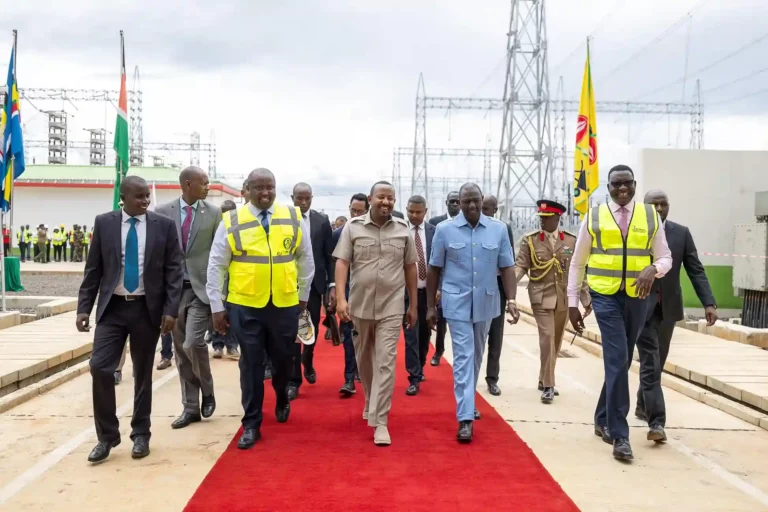At the end of February, Kenya was a beehive of activities, with Nairobi hosting high-profile international visitors, including heads of state and government.
Most visitors were in town to attend the sixth session of the United Nations Environment Assembly (UNEA-6), which was hosted at the United Nations Environment Programme (UNEP) headquarters in Gigiri.
Not far from Gigiri, the State House was busy. President Ruto hosted several leaders, some of whom were in the country for the UNEA-6.
One leader was particularly accorded special attention and treatment. From being received at the Jomo Kenyatta International Airport (JKIA) by President Ruto himself to inspecting a guard of honour at State House and receiving a 21-gun salute, Ethiopian Prime Minister Abiy Ahmed was in the country for a state visit. This was Abiy’s first state visit to the country since President Ruto assumed power in September 2022.
The visit came in a recently troubled context for the Ethiopian Prime Minister.
Landlocked Ethiopia Seeks Sea Access
Earlier in the year, Ethiopia signed a highly contentious deal with Somaliland, granting the former access to the Red Sea.
With Eritrea’s secession in 1993, Ethiopia has had to contend with a strategic geographical limitation: being landlocked.
The acrimonious border fallout in 1998 cut off Ethiopia’s access to the Red Sea via Eritrea’s ports. It was a harvest for Djibouti, hitherto controlling over 90% of Ethiopia’s sea-bound traffic, both exports and imports.
Upon assuming office in 2018, Prime Minister Abiy profiled Ethiopia’s challenge in accessing the sea as a limitation that must be addressed if his grand vision for the country is to stand a chance.
He has openly stated his desire to reestablish Ethiopia’s standing navy to protect its marine interests.
His strategy to address the impediment is diversifying gateways to minimize the risks associated with Djibouti’s near monopoly.
Kenya and Ethiopia Discuss Collaboration on Lamu Port
Kenya, Somalia, and Sudan have been on his radar. Early in his term in 2018, he signed a deal with Sudan to access Port Sudan.
In the same year, Kenya agreed to acquire land in Lamu Port as part of the Lamu Port-South Sudan-Ethiopia Transport (LAPSSET) project.
However, the deal with Somaliland early this year triggered a diplomatic crisis for PM Abiy, with Somalia bitterly opposing what it views as a violation of its territorial integrity.
Somalia considers the breakaway Somaliland to be part of its territory. Vowing to defend itself, Somalia has sought alliances that tacitly point to its countering Ethiopia, first with Egypt and most recently with Turkey.
The preceding context cannot be divorced from Abiy’s recent visit to Kenya. Alongside other bilateral talking points, the talks must have featured access to the sea.
Both countries reportedly agreed to collaborate to facilitate Ethiopia’s easy use of the Lamu Port. Areas reported to have been identified for ironing out include security and tariffs.
Kenya Needs Strong Security Strategy to Secure LAPSSET
Security challenges pose an existential threat to LAPSSET’s viability. The port supports the infrastructure of roads, pipelines, and railways that run through an Al-Shabaab-infested corridor. For instance, the construction of the Lamu-Ijara-Garissa LAPSSET access road has fallen behind schedule, a factor attributed to constant sabotage by terrorists.
Launched in April 2021, the road was scheduled to be completed by May 2023.
Only about half of the work had been achieved, with minimal work underway.
If the government is keen to secure LAPSSET’s viability, it must establish an elaborate security strategy. The project runs through a section of the country that has suffered from historical neglect.
The freedom and ease with which terrorists roam and unleash terror point to the fact that the space remains largely ungoverned. The contentious deal between Ethiopia and Somaliland can only compound the security challenge for Kenya. It has reportedly boosted Al Shabaab’s recruitment effort, with some joining out of nationalistic motives.
Naturally, LAPSSET will constitute a ‘legitimate’ target in Al-Shabaab’s attempt to hit back. Ethiopia’s commitment to use LAPSSET is not a foregone conclusion.
Many are still in the race, and outreach to Kenya might be Addis Ababa hedging its bets to seek the best deal.
Therefore, strengthening security is a definite strength for Kenya in its quest to tilt the balance in its favour definitively.
Africa Must Strive to Earn Its Place in the International System




